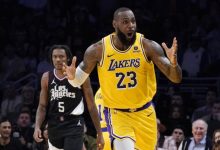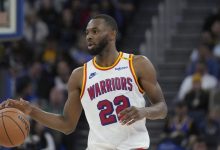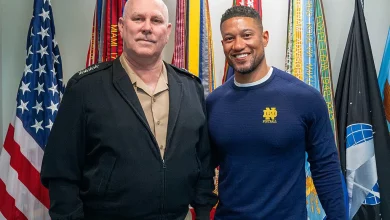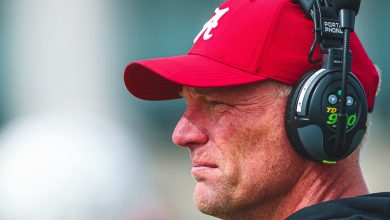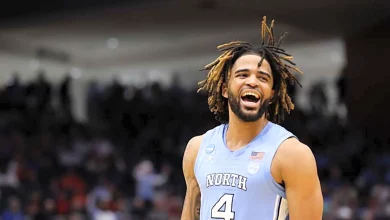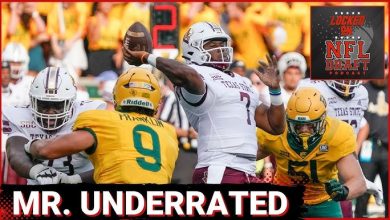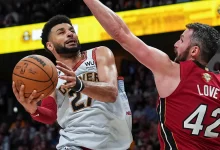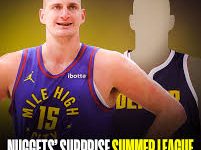Marcus Morris claims the Los Angeles Lakers lack the “toughness” of previous LeBron James championship teams, criticizing their grit and mental resilience.

When a player like Marcus Morris speaks up, it’s often a statement worth considering. Morris, known for his outspoken nature and physical style of play, recently took aim at the Los Angeles Lakers, specifically their “toughness,” or lack thereof, compared to LeBron James’ previous championship teams. According to Morris, the current Lakers squad lacks the same grit, mental resilience, and overall toughness that characterized LeBron’s past title-winning teams. This assertion, though controversial, brings forth an interesting conversation about the evolution of the Lakers, the championship DNA that LeBron’s teams have historically carried, and what the Lakers are missing in their current roster construction.
LeBron James’ championship pedigree is undeniable. Over the course of his career, he has won four NBA titles, three with the Miami Heat (2012, 2013) and one with the Cleveland Cavaliers (2016). His most recent championship came in 2020 with the Los Angeles Lakers, marking the team’s 17th championship in franchise history. Each of these teams had certain characteristics in common, such as tough defense, mental fortitude, and an ability to win close games in clutch moments. These teams were built not only around LeBron’s immense skill set but also on a foundation of toughness—both physical and mental—that made them formidable opponents in the postseason.
Marcus Morris’ remarks have sparked a deeper discussion about what defines toughness in an NBA championship team, particularly when it comes to a LeBron-led squad. Does toughness come from having a bruising big man or a tenacious perimeter defender? Does it involve leadership and experience, or is it about depth and skill? And, crucially, how does the current iteration of the Lakers stack up in this department?
The Hallmarks of LeBron’s Championship Teams
LeBron James has played alongside many talented players throughout his career. Yet, what often stands out when looking at his championship teams is the complement of skill, resilience, and toughness that has defined these rosters. Let’s break down the core elements of those teams.
1. The 2012 and 2013 Miami Heat
When LeBron joined the Miami Heat in 2010, he joined forces with Dwyane Wade and Chris Bosh to form a “super team” that was expected to dominate the league. It didn’t take long for the trio to gel, and by 2012, the Heat had developed into a championship-caliber team. The 2012 and 2013 Heat rosters were marked by their versatility, defense, and, above all, toughness.
The Heat were known for their suffocating defense, led by LeBron and Wade, who were both elite perimeter defenders. This defensive toughness allowed Miami to play with an edge, disrupting opposing offenses with their physicality. The team’s mental resilience was equally impressive. After a crushing defeat in the 2011 NBA Finals to the Dallas Mavericks, the Heat came back with a vengeance in 2012, defeating the Oklahoma City Thunder in the Finals and securing LeBron’s first title. The mental toughness to bounce back from a loss and perform on the biggest stage is something that LeBron’s teams have always been known for.
LeBron’s leadership was a key factor in this as well. The Heat’s success wasn’t just about star power but about a collective mentality built on hard work, discipline, and a refusal to back down.
2. The 2016 Cleveland Cavaliers
The 2016 Cavaliers are arguably LeBron’s most iconic championship team, primarily due to their historic comeback from a 3-1 deficit in the NBA Finals. The Cavs were not expected to win the title, especially after the Golden State Warriors set an NBA record with 73 regular-season wins. But the Cavaliers’ toughness was on full display as they weathered the storm, battled back, and ultimately triumphed in Game 7.
LeBron, of course, was the centerpiece, but this team had a grit and determination that made them dangerous. Cleveland’s defense, highlighted by LeBron’s block in Game 7, epitomized the team’s resilience and mental fortitude. The Cavs were never intimidated by the Warriors’ regular-season dominance, and they used that chip on their shoulder to fuel their performance.
What stood out most in 2016 was the team’s ability to perform under pressure. LeBron’s leadership, paired with Kyrie Irving’s clutch shot-making, allowed the Cavs to outlast Golden State. But the defensive effort, particularly from LeBron and his teammates, was key. It was a team that was both mentally tough and capable of executing on the biggest stage.
3. The 2020 Los Angeles Lakers
LeBron’s most recent title came in 2020, when he led the Lakers to their 17th championship. This team, however, was built quite differently from his previous championship squads. With the addition of Anthony Davis, the Lakers became an incredibly tough defensive team, anchoring their efforts with size, physicality, and intensity. Davis provided the shot-blocking and rebounding that made the Lakers’ defense formidable, while LeBron continued to orchestrate the offense with precision and leadership.
The Lakers’ toughness in the bubble was critical to their success. With an unconventional environment, facing adversity both on and off the court, the Lakers displayed resilience that spoke to their mental toughness. The team handled the challenges of the bubble with focus, determination, and a relentless desire to win. LeBron’s ability to lead this team through uncertainty, while also adjusting to the new playing conditions, showcased his maturity and leadership.
The Lakers’ defense in 2020 was their foundation, and the mental toughness of the squad helped them stay focused throughout a grueling postseason. In many ways, the 2020 Lakers exemplified the balance between mental fortitude and physical toughness, which had been a staple of LeBron’s championship teams.
What Marcus Morris Sees in the Lakers Today
With that history in mind, Marcus Morris’ comments about the current Lakers squad bring into focus some pressing questions about the team’s makeup. While LeBron James remains an elite player, there are concerns about the toughness of the roster. Morris claims that the Lakers lack the same grit and mental resilience that LeBron’s past championship teams had. But is this criticism valid? What exactly does Morris mean by “toughness,” and how can the Lakers improve in this regard?
1. Lack of Physicality
One of the primary criticisms that Morris seems to be referring to is the Lakers’ lack of physicality, particularly in the frontcourt. LeBron’s past teams have been able to impose their will on opposing teams with tough, physical defenders like Wade, Bosh, and Davis. While Anthony Davis is still a dominant defender, the rest of the Lakers’ frontcourt has lacked the same level of consistency and physical presence. The team has struggled at times to protect the rim and dominate the boards, two key areas that contribute to a tough, resilient team.
2. Mental Toughness and Consistency
Another issue that Morris points to is the Lakers’ mental toughness. While LeBron has always been a fierce competitor, there have been times in recent years when the Lakers have struggled to close out games or stay consistent in high-pressure situations. The team has often been criticized for lacking focus in the regular season, which can translate to mental lapses in the postseason. This is an area where LeBron’s past championship teams were particularly strong, especially in critical moments.
3. The Need for Leadership
The Lakers also face a leadership gap beyond LeBron. While LeBron’s leadership is unquestioned, the team lacks another voice who can provide guidance, especially during tough stretches. In Miami, Wade was there to share the load, and in Cleveland, players like Kyrie Irving and Kevin Love provided additional leadership. With the Lakers, the reliance on LeBron to shoulder the leadership role can sometimes be too much, and the team lacks a secondary voice that can step up when needed.
Can the Lakers Respond?
The Lakers have shown at times that they are capable of playing tough, resilient basketball. The key to living up to the expectations set by previous LeBron teams will be about finding consistency and fostering a team-wide commitment to playing physically and mentally tough basketball. It will also require improvements from the supporting cast, especially in terms of defense, rebounding, and closing out games.
In the end, Marcus Morris’ comments are not necessarily a critique of the Lakers’ talent but a reminder of the importance of the intangibles that make championship teams successful. If the Lakers can find a way to bring more toughness to their game—both physically and mentally—they could once again become a true contender in the Western Conference.
LeBron James has always been known for his leadership and resilience, but he needs his teammates to rise to the occasion. The Lakers must adapt, find their toughness, and rediscover the grit that has defined LeBron’s greatest teams in order to make another championship run.

